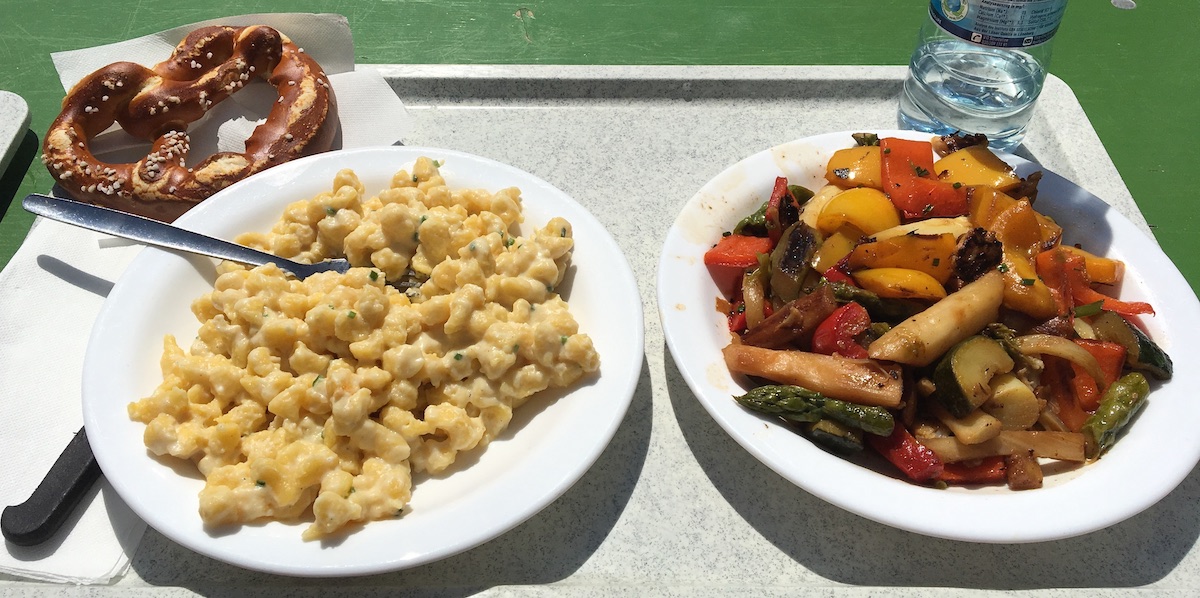When Oktoberfest, the festival known for fried meat and drinking beer by the gallon advertises a vegetarian guide to the event, you know the world is changing.
In a city known for its deep-fried Bavarian tradition, it’s becoming more possible to find vegan and vegetarian items on the menu. In Munich, much of the cuisine is evolving to incorporate current food habits, giving people of all diets the chance to enjoy traditional culture while staying on plan.
Why It’s Newsworthy: As more people across the world discover their dietary restrictions, experiencing new cultures may be a bit of a challenge. The acceptance of vegetarian and vegan lifestyles around the world is prompting Bavarians to cater to these new tastes while still keeping tradition at the forefront.
Hometown Roots
For one Municher, Bavarian food has been a part of life since birth.
Twenty-three-year-old Jimmy Dögerl grew up in the small Bavarian town of Marquartstein, where local food was an important part of his upbringing.
“My grandpa was a cook a long time ago and my father still makes something Bavarian at least once a month,” Dögerl said. “We ate schweinebraten a lot, it’s a roast pork with stew that you usually eat with dumplings or potatoes. That’s the most typical thing where I’m from.”
Since moving to Munich for college and eventually settling down in Berlin, Dögerl’s food habits have slightly evolved, but he still falls back on his Bavarian roots when he can.
[In Berlin] it’s a pretty different atmosphere,” said Dögerl. “I eat way less meat now than I did growing up. That’s the thing in Bavaria, you eat a ton of pork, but I still enjoy eating it with my family when I come home.”
Sticking to a vegetarian diet in Bavaria can be a challenge, but people like Dögerl are able to enjoy some hometown cuisine without meat with dishes such as dumplings or the German spaetzle noodle.
Keeping the Tradition Alive
Oktoberfest is a vital part of Munich’s identity, drawing around six million visitors a year according to the City of Munich Department of Labor and Economic Development. This beer-filled festival’s represented the Bavarian culture found in Munich since 1810.
The traditional festival has expanded to include vegetarian options, with its official website even offering a “guide” to the perfect meatless Oktoberfest experience.
Despite Oktoberfest’s time frame of only two weeks of every year, traditional Bavarian food sold at the festival such as beer, pretzels and bratwursts are still a large part of Munich’s everyday life.
Brewhouses such as Hofbräuhaus have been tied to Munich’s culture for almost 500 years. Now, as one of the most famous taverns in the world, Hofbräuhaus continues to serve and preserve Bavarian tradition.
Serving everything from schnitzel to pretzels, Hofbräuhaus has become a food and drink hotspot for locals and tourists alike. Even if some of the food scene in Munich is adapting, there’s no need to worry about finding a nice traditional meal nearby.
Modern Food for Everyone
The Viktualienmarkt, a market located steps from Munich’s city center in Marienplatz, is a hub for tourists and locals to explore and pick up a variety of local fare.
Out of the hundreds of vendors set up here, a small-scale Bavarian shop stands out as one of the only all-vegan shops in all of Munich: Gut Zum Leben.
We produce all of our own products from eight farms here in Bavaria,” said Ruth Allersmeier, a Munich resident who works at Gut Zum Leben and is native to the Bavarian countryside. “We also don’t have any animals for using so all of our products are vegan.”
According to Allersmeier, many tourists from all over the world come to Munich seeking a vegan alternative to Bavarian foods. Gut Zum Leben looks to fill that gap and produce high-quality vegan food.
Everything Gut Zum Leben sells is all natural.
“All of our sweets are handmade and produced in our home bakery,” Allersmeier said. “All of our food is made without any chemical additives or flavor enhancers.”
The shop’s dedication to keeping natural and delicious Bavarian food available for all shows that some Munichers are adapting their traditional cuisine to match current trends.
Bavarian food may be expanding to catch up with the times, but many locals are dedicated to preserving their culture. Traditional Bavarian food isn’t going anywhere, but new options are always popping up for the alternative eater.
Jessica Martin is a junior majoring in public relations in the Grady College of Journalism and Mass Communication at the University of Georgia.








